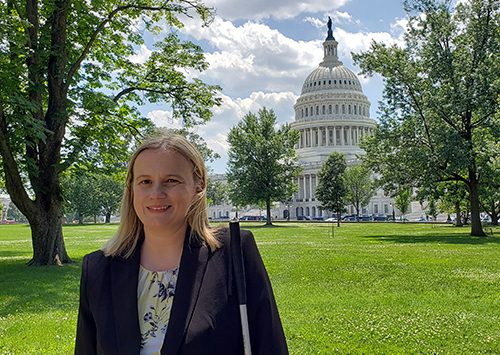More by this author
What You Need to Know About the COVID-19 Relief Package
After a marathon week of negotiating, Congress has wrapped up final deliberations and voted to pass a COVID-19 relief package for individuals, businesses, and local governments, which are continuing to deal with the coronavirus pandemic. On hold since May, when the House of Representatives passed the Heroes Act, Congress finally agreed to provide about $900 billion in aid as part of a massive 5,600-page year-end omnibus appropriations bill. That means the bill will fund both coronavirus relief…
Author
Sarah Malaier
Blog Topics
Coronavirus (COVID-19) Resources, Public Policy
What We’re Reading: “Supreme Court Blocks Curbside Voting”
NPR, October 21, 2020: Supreme Court Blocks Curbside Voting In Alabama, An Option During Pandemic
One of the quotes that really stuck out from AFB’s Flattening Inaccessibility survey was a story about curbside voting.
“I voted in the primaries, but the polling place did not have a ramp, and though they offered to bring the portable voting booth out, they would only do that if you parked your car in the designated spot. Since we got dropped off by Lyft, we did not have a car. So, two…
Author
Sarah Malaier
Blog Topics
Public Policy, Coronavirus (COVID-19) Resources
Governors: Treat Transportation as an Essential Service for People with Disabilities
The American Foundation for the Blind's Public Policy and Research Institute, working in coalition with the Consortium for Citizens with Disabilities, wrote to the National Governors Association to express the needs of public transportation users with disabilities as states across the country implement reopening policies.
In particular, we joined forces to highlight the considerations that the country's governors must take as transit and other transportation services transition back to the…
Author
Sarah Malaier
Blog Topics
Coronavirus (COVID-19) Resources, Public Policy
Congressional Hearings on School Reopenings
Last week, the Senate Committee on Health, Education, Labor, and Pensions held a hearing on returning to K-12 schools safely. Considering that students with disabilities are often left out of the conversation, it was exciting to hear that they were considered in multiple lines of questioning presented by the witnesses and the Senators themselves. From the witnesses, we learned that educators are deeply concerned about the digital divide, the health and safety of students and educators, and…
Author
Sarah Malaier
Blog Topics
Education, Public Policy, Coronavirus (COVID-19) Resources
AFB Applauds Reintroduction of the Disabled Access Credit Expansion Act
As we celebrate the 29th Anniversary of the ADA, AFB is pleased that Representatives Jim Langevin and Donald McEachin and Senator Tammy Duckworth have led the reintroduction of the Disabled Access Credit Expansion Act.
The bill increases the amount of the Disabled Access Credit, which helps businesses afford renovations to become more accessible to people with disabilities, expands the number of eligible businesses, and invests in programs that mediate ADA-related disputes and help individuals…
Author
Sarah Malaier
Blog Topics
Public Policy, Employment
How Is the Federal Government Working for People with Vision Loss?

We are only halfway through the summer, but it has already been a busy one for AFB’s Public Policy team. In addition to bringing on board our new Director of Public Policy, Stacy Cervenka, we have been hard at work lending our expertise to the federal government on issues affecting people who are blind or visually impaired. Keep reading for an insight into the recent positions we have taken and comments submitted!
Eliminating Subminimum Wages and Realizing Our Employment Potential
The…
Author
Sarah Malaier
Blog Topics
Employment, Public Policy
Obtaining Access to E-books ...Again
The American Foundation for the Blind was pleased to learn that the Librarian of Congress had approved the US Copyright Office’s recommendation to exempt certain classes of works from copyright restrictions to improve access to those works by people who are blind or visually impaired. Every three years, the Copyright Office conducts a rulemaking procedure to determine which classes of works should be exempt from the "prohibition on circumvention of copyright protection systems for access…
Author
Sarah Malaier
Blog Topics
Books, Public Policy, Reading, Technology